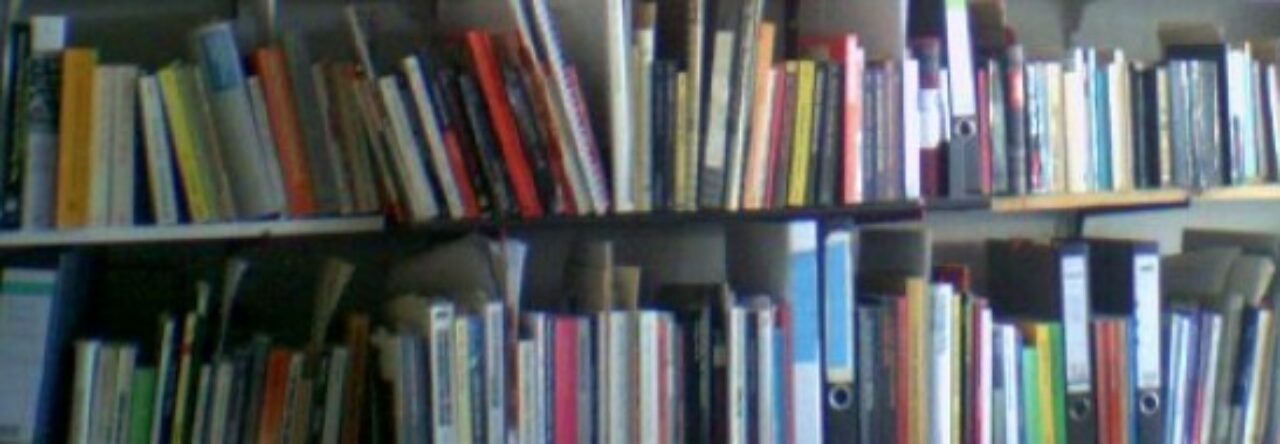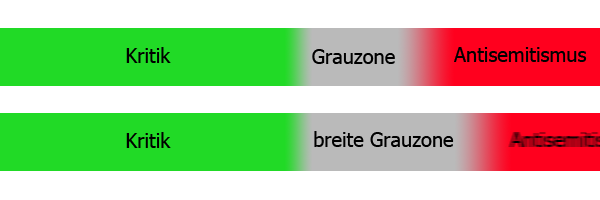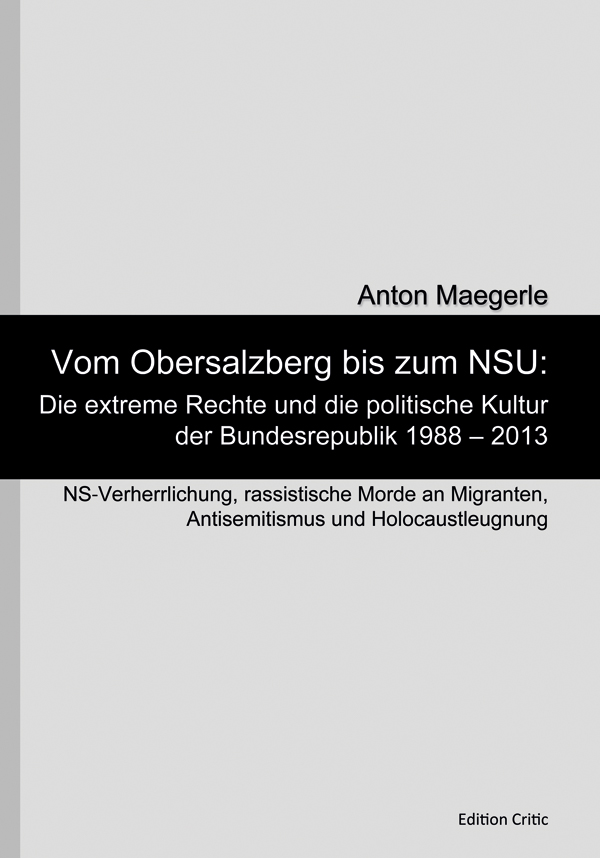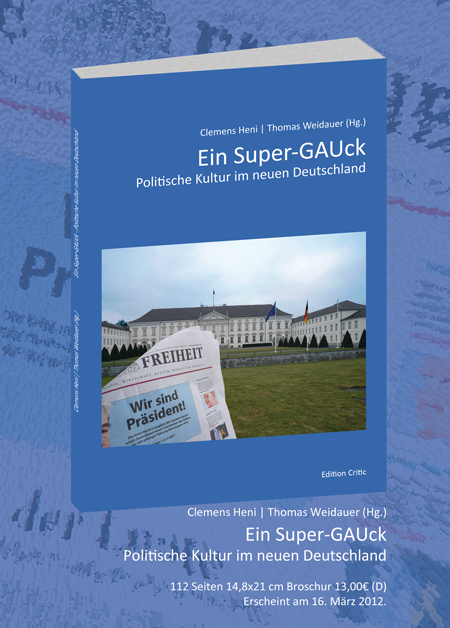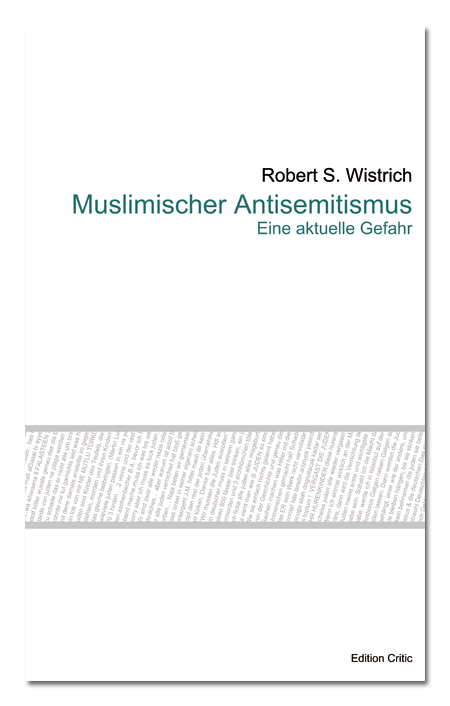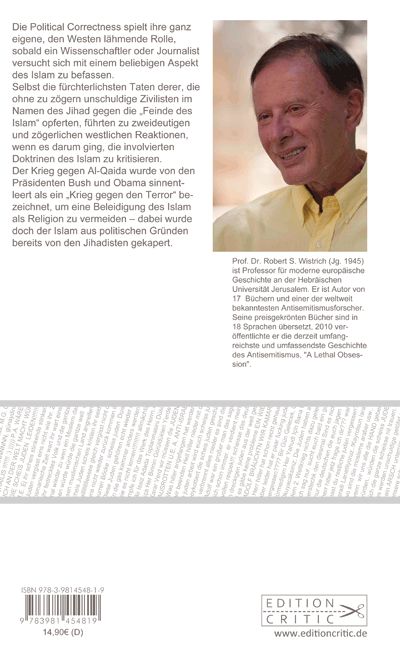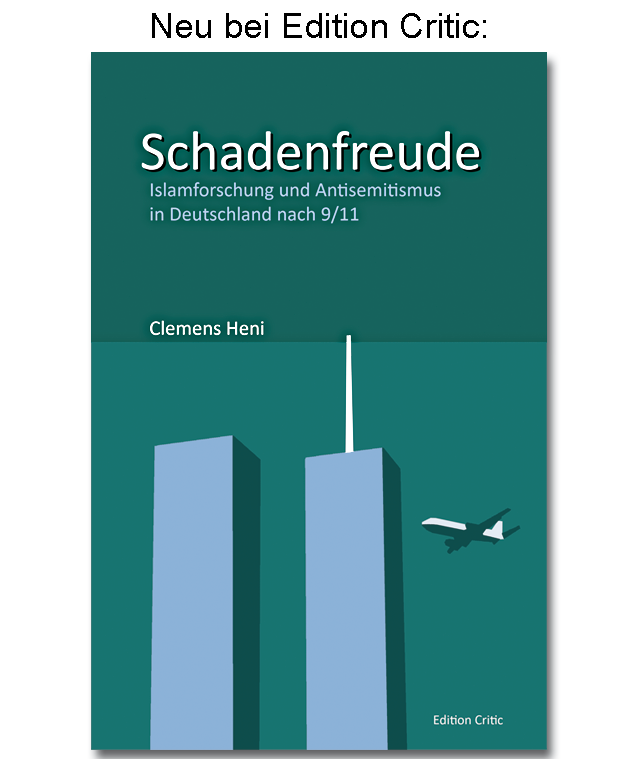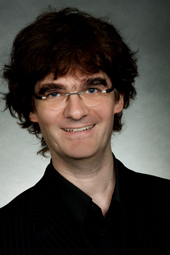Edition Critic – NEW Book
Antisemitism: A Specific Phenomenon
Holocaust Trivialization – Islamism –
Post-colonial and Cosmopolitan anti-Zionism
by Clemens Heni
This entry provides the following information:
1) The Book: bibliographical information
2) Cover pictures
3) About the book
4) About the author
5) Praise for the book
6) Foreword
7) List of Contents
1) The Book: Bibliographical information
Clemens Heni
Antisemitism: A Specific Phenomenon
Holocaust Trivialization – Islamism – Post-colonial and Cosmopolitan anti-Zionism
ISBN 978-3-9814548-5-7
Berlin: Edition Critic, 2013
Studies in Antisemitism/Studien zum Antisemitism Vol. 3/Band 3
33 € ($ 42) (£ 26)
xi + 648 pages 6“ x 9“ (15.2cm4x22.86cm) *Bibliography *Index
2) Cover pictures
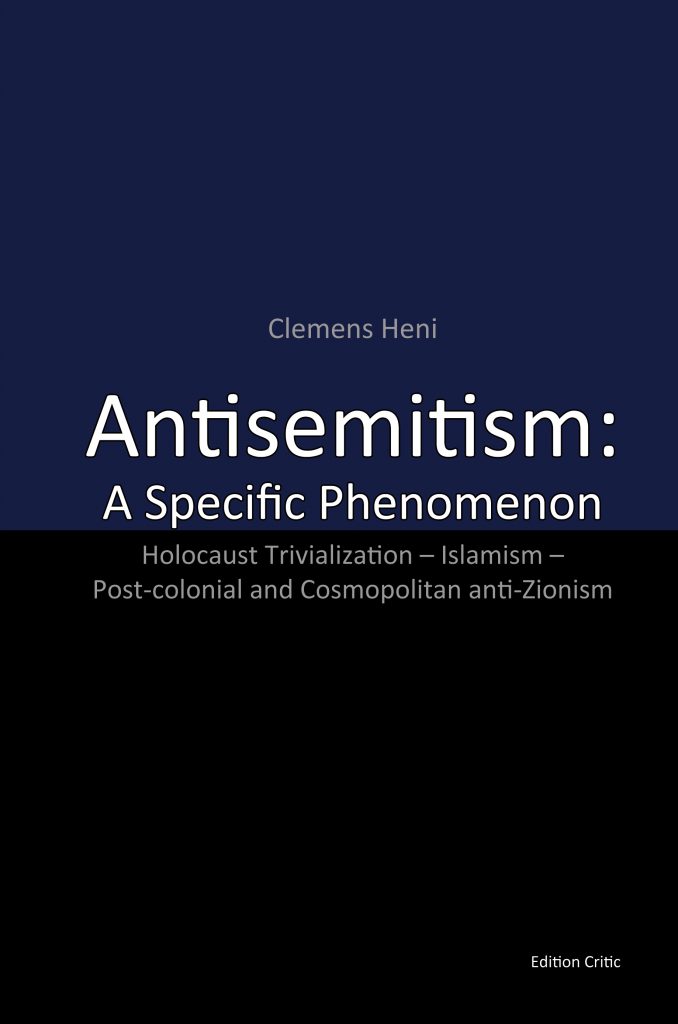

3) About the book
This book analyzes the specifics of antisemitism and Jew-hatred in the 21st century. It includes a groundbreaking assessment of the political leanings of many prominent scholars in the field. Today’s antisemitism extends far beyond right-wing circles and can be found among liberals, leftists, anti-racist communities, Islamists, and post-colonial scholars in the Western world. Using English and German sources, the author demonstrates the need to oppose Holocaust trivializiation as well as other ‚modern‘ forms of antisemitism like anti-Zionism and the defamation of the Jewish state of Israel.
4) About the Autor
Clemens Heni holds a PhD in political science from the University of Innsbruck, Austria („summa cum laude,“ 2006). In 2008/2009 he was a Post-Doctoral Associate at Yale University. He is the Director of the Berlin International Center for the Study of Antisemitism (BICSA), founded in 2011. Click here for more information.
„A thorough, objective and intelligent analysis of the principal form taken by contemporary anti-Semitism.“
Dr. Anthony Julius, London, author of Trials of the Diaspora: A History of Anti-Semitism in England (2010, 2012); Deputy Chairman, Mishcon de Reya; Chairman, London Consortium; Visiting Professor, Birkbeck College, University of London; Vice-President of the Diana, Princess of Wales Memorial Fund; in 1992 he wrote a doctoral dissertation at University College London (UCL) about T.S. Eliot, Anti-Semitism and Literary Form
***
“A fascinating research, an important book, an alarming perspective.”
Dr. Simon Epstein, Historian, Jerusalem; latest publication 1930. A Year in the History of the Jewish People (2011, in French)
***
“Clemens Heni’s monumental book is a timely reminder of the central role of Jews‘ hatred in Jewish and world history. What began in antiquity, and continued in the Middle Ages, as hostility to the Jewish „other“ of the pagan and, later Christian world, turned in the 19th century to rejection of the Jews‘ attempts to shed their uniqueness and become like the rest of the people among whom they lived. European antisemitism led to the Holocaust, and post-Holocaust guilt feelings camouflaged it for several decades. Meanwhile, the Jewish problem moved from Europe to the Middle East, and was elevated from the personal and communal level to the national one. The Jewish State faces the problem of acceptance as much as the Jewish individual faced it before the Holocaust. As Heni meticulously shows, present antisemitism – sometimes disguised as anti-Israelism or anti-Zionism – is carried by a peculiar coalition: successors of European pre-war right-wing antisemites, the post-colonial radical left and fundamental Islamists, Suni and Shi’ite alike. Only Jew-hatred could unite these conflicting elements. This is an important book, published in a crucial time.”
Prof. Dr. Yoav Gelber, Interdisciplinary Center, Herzliya, Israel; Professor, Department of Land of Israel Studies, Haifa University, author of many books on the Second World War, Israeli history, and the Israel Defense Forces (IDF)
***
Clemens Heni’s „Antisemitism: A Specific Phenomenon“ is a masterful and very sobering analysis of global anti-Semitism. It is an academically respectable „call to arms;“ a passionate and yet dispassionate account of virulent Jew hatred in the Islamist world and its „politically correct“ counterpart in the West. Read it and weep. Read it and join those among us who have not lost our moral sanity or historical post-Holocaust memory.
May we join Heni–who excels in the nuances of contemporary German and European anti-Semitism and in its North American counterpart–in standing up to the ruthless Lies. Heni understands that comparing alleged discrimination against Muslims with the genocidal extermination of the Jews is itself one of the many new forms of Jew hatred. He also understands that the entire western academic enterprise is endangered by its cowardly and opportunistic refusal to tell the truth about the Jews, Israel, and antisemitism.
Prof. Dr. Phyllis Chesler, Emerita Professor of Psychology and Women’s Studies, City University New York, author of 15 books, including her bestseller Women and Madness (1972), The New Anti-Semitism (2003) and The Death of Feminism: What’s Next in the Struggle For Women’s Freedom (2005)
***
“Clemens Heni understands the insidiousness and perfidy of contemporary antisemitism, hiding as it does behind many veneers of respectability. Drawing on a superb background and experiences on several continents, he exposes many deceitful aspects of contemporary Holocaust denial, Muslim antisemitism, and hatred emanating from the extreme right and left. He is a man of great courage endowed with a strong sense of mission. Heni fights a battle to restore integrity to academia and the left. He fights against antisemitism in all its forms, and he does so with outstanding intellectual expertise. Bravo!”
Prof. Dr. Neil Kressel, William Paterson University, Department of Psychology, Author of “The Sons of Pigs and Apes:” Muslim Antisemitism and the Conspiracy of Silence (2012) and Bad Faith: The Danger of Religious Extremism (2007)
***
“This is a courageous work on a problem of great contemporary relevance. Antisemitism is once again emerging as a major threat in many locations today. Fueled by a variety of dark causes, and present in groups on both the political right and the political left, as well as among Islamists, it again poses a fundamental threat not only to Jews but also to western civilization. Heni’s work forces all of us to think deeply about the matters of prejudice and hatred and is a contribution to all those who are seeking ways to combat these plagues.”
Prof. Dr. Steven Katz, Slater Professor of Holocaust and Judaic Studies, Director of the Elie Wiesel Center for Judaic Studies, Boston University; author of numerous books on the Holocaust, Judaism, Jewish Thought, Religious Thought, Post-Holocaust Dialogues; National Jewish Book Award runner-up for Wrestling with God: Jewish Theological Responses During and After the Holocaust (2007)
***
“Clemens Heni is a young scholar with true courage. He has taken on a subject that is uncomfortable for academics. By turning a mirror at the academic world he has shown that the evil of anti-semitism has a strong foothold in the academy. The new anti-semitism does not wear the same clothes as its Christian, rightwing and Nazi fore bearers. It wears a new mantle of anti-Israelism and Islamic Judeophobia. Whereas Islam’s mythic fear of Jews is unwarranted and unsubstantiated; the reality based Jewish fear of Islam has been reified and replicated over and over again from Iran to North Africa to Europe by real facts of murder, terror and intimidation and threat. If only 10% of the Islamic world embraces anti-Jewish and anti-Israel hatred then that means more than 100 million people have the potential to act on their fears. Heni points this out in a well-documented fashion. Of special note for anyone is his description of the destruction of the Yale Anti-Semitism center. This is a must read book.”
Prof. Dr. Samuel Edelman, Professor Emeritus, Jewish Studies, Holocaust Studies, and Communication Studies, California State University (CSU), Chico; Founder of the program in Modern Jewish and Israel Studies at the California State University Chico in Northern California; Former Executive Director, Scholars for Peace in the Middle East (SPME); Director and CEO, Center for Academic Engagement and, Faculty Affairs Advisor, Israel on Campus Coalition, Washington, DC
***
“In Clemens Heni’s Anti-Semitism: A Specific Phenomenon we have a rare combination of courage and acumen, much needed in the study of this highly volatile topic. Basing his findings on a vast range of research, Heni’s analysis of German anti-Semitism, its ties to contemporary Islamism, and implications for anti-Zionism is penetrating and deeply insightful. His assessment of the current scholarship on anti-Semitism, with all the controversies that go with it, is eye-opening, exhaustive, and indispensable to contemporary and future scholars. It is a ‘must read’ for students and scholars alike.”
Prof. Dr. David Patterson, Hillel Feinberg Chair, Ackerman Center for Holocaust Studies, The University of Texas at Dallas; A winner of the National Jewish Book Award and the Koret Jewish Book Award, Patterson has published more 30 books; author of A Genealogy of Evil: Anti-Semitism from Nazism to Islamic Jihad (2010)
***
“Antisemitism is a not a breakaway territory in the mainland of modernity; nor is its illogical aberration. Whether we like it or not, but the unpleasant truth is that antisemitism is a significant and inescapable part of modernity. By no means were demonization of the Jews and the charge of maleficium for their supposed collective participation in occult evil just a marginal trait in Christian Europe. Incredible as it sounds, it was its substantial and essential feature which did not contradict the greatest cultural and intellectual accomplishments of medieval and Renaissance Europe. The same may be said about modern antisemitism which was practiced in the most civilized European societies and sophisticated scholarly circles. Antisemitism did not deny the modern project with its promises of equality, pursuit of happiness, just society, and better life. Likewise, modernity did not deny antisemitism until the Catastrophe of Humanity which we know as the Holocaust.Perhaps this is one of the reasons why Clemens Heni, in his profound and painstaking study, aptly describes antisemitism as a specific, strange, awkward, and paradoxical phenomenon, which departs from our modern sensibilities and fails us as human beings, which leaves us devastated, disenchanted, yet which stays… It is still there whatever we say and whatever we do. It changes its forms over time, it walks in disguise as an honest and liberal criticism of Israel, it masquerades as a perfectly legitimate and consistent fight for human rights, it lends itself to philosophy and cultural studies, it misleads politicians, and it misguides scholars, yet it does not disappear.Why is it so? Clemens Heni’s timely and important book will help us throw more light on antisemitism – this specific phenomenon, as the author would have it.”
Prof. Dr. Leonidas Donskis, Department of Political Science, Vytautas Magnus University, Kaunas, Lithuania; Member of European Parliament (MEP), ALDE (2009–2014)
***
“Clemens Heni’s important book is both necessary and disturbing. His laser-like focus on the specificity of antisemitism, the longest lasting social pathology in Western civilization, is a much needed reminder that Jew-hatred combines with Holocaust denial and trivialization are linked in the ongoing attempt to demonize, delegitimize and, ultimately, destroy the State of Israel. Heni’s nuanced and informed analysis confirms the ‘treason of the intellectuals’ on both the right and left wing, while revealing the extent to which Islamic fundamentalism is bent on destroying Israel.”
Prof. Dr. Alan Berger, Raddock Family Eminent Scholar Chair in Holocaust Studies; Director, Center for the Study of Values and Violence after Auschwitz; Florida Atlantic University, Boca Raton, Florida; author or numerous books on Holocaust Literature
***
„Coming to the defense of Jews and Israel has never been an exercise for faint-hearted people. Clemens Heni undertakes that defense with skill and consummate scholarship as well as courage.“
Prof. Dr. Edward Alexander, Professor emeritus, Department of English, Washington State University, Seattle, author of The State of the Jews. A Critical Appraisal (2012)
***
“Clemens Heni says: ‘A scholar on antisemitism who is not doing advocacy for Jews is fooling him‐ or herself. A doctor who is looking for new medicine is doing advocacy ― for mankind ― as well as scholarship.’ Heni espouses Antisemitism Studies as a rigorous academic field in its own right while rejecting a bogus neutrality toward the subject matter. By synthesizing extensive scholarship, an incisive critical faculty, and good old fashioned chutzpah, Heni has produced a major work that is so individual that any stray page would tell you who its author is. By intrepidly taking on some of the most famous historians of the generation and demonstrating where they have fallen right into trendy mindsets lavishly underwritten by powerful forces of Left and Right (in roughly equal measure), Heni sensationally unmasks and dethrones a number of today’s icons. He does it in a freewheeling style that captivates the reader. One doesn’t have to agree with him on everything to appreciate that this book is a foremost and invaluable contribution to the debate, not least in Holocaust Studies, which continue, along with Israel, to occupy center stage of the European debate.”
Dr. Dovid Katz, Dovid Katz was visiting professor in Judaic studies at Yale University in 1989–1999. From 1999 to 2010 he was professor of Yiddish language, literature and culture at Vilnius University, Lithuania. He is based in Vilnius, where he edits
www.DefendingHistory.com
***
“At a time when anti-Semitism is on the upsurge around the world, and Iran is threatening to destroy the one Jewish state, Clemens Heni provides a vital analysis of the threat and the need to act to fight this scourge before it is allowed to spread further and cause the type of catastrophe that Jews have experienced all too often in their history.”
Dr. Mitchell Bard, Executive Director of the American-Israeli Cooperative Enterprise and author of The Arab Lobby (2010)
***
Clemens Heni’s book „Antisemitism – a Specific Phenomenon“ sheds important light on a problem which characterizes societies in crises. The deeper a crisis in a society is, the stronger is its need for someone to blame, and the Jew is always there to serve as a scapegoat; there are Jews in Europe, and there is – voilà – Israel, the state of the Jews. Classic anti-Jewish attitude which is deeply rooted in Christianity, found its way to classic Islamic discourse and immigrated to Europe to amplify the local, original, version. People in the media, academia and the arts compete as to who will wage a better covert war against the Jew, by using, or rather abusing, Israel and its struggle for survival, as a means to blame the Jew for all the world’s problems.
Horrible events such as the Holocaust are denied, minimized, justified and even posed as a Zionist plot, and the Jew who is depicted as controlling the world’s economy, media and politics becomes the common enemy, the cause of all problems of societies in crises.
Clemen’s Heni’s book is a very important document for anyone who wants to understand how Jews became the scapegoat of Europe in particular and the declining West in general.
Dr. Mordechai Kedar, Lt. Col. (res.) Israel Defense Forces (IDF), The Begin-Sadat-Center for Strategic Studies (BESA), Bar-Ilan University, Ramat Gan (Israel)
***
“Only by taking the Holocaust as a unique and unprecedented crime against the Jewish people can its full historical implications be understood, so that steps may be taken to avoid its recurrence. No one is safe. Clemens Heni uses his deep study of German National Socialism and Neo-Nazi activity to uncover the depths of contemporary anti-Semitism, a disease exponentially growing both on the left and on the right, in Western civilization and in Islam, often under the thin veil of anti-Zionism and anti-Americanism. This virulent plague of our times attacks individuality, enlightened reason, scientific thought and democracy—all the freedoms we hold dear. I cannot praise this book too highly.”
Prof. Dr. Norman Simms, Associate Professor (emeritus) in the Department of Humanities and English at University of Waikato in Hamilton, New Zealand, author of Alfred Dreyfus: man, milieu, mentality and midrash (2012)
***
“This penetrating study systematically exposes the intertwining of anti-Zionism and contemporary antisemitism and Western academia’s papering over the Islamist threat to Jews and the West. Heni analyses the pernicious trend to universalize and trivialize the Holocaust and minimize the role of antisemitism. He reveals Germany’s continuing refusal to grapple honestly with antisemitism and the meaning of the Holocaust.”
Prof. Dr. Stepehn H. Norwood, University of Oklahoma, Department of History, author of The Third Reich in the Ivory Tower: Complicity and Conflict on American Campuses (2009)
When I started working on this book project several years ago, I did not anticipate the significant and specific rise of antisemitism in the year 2012 alone, when this study was finished.
This book was written for the interested public, for scholars in the field, for undergraduate, graduate, and postgraduate students, for journalists, decision-makers, politicians, philanthropists, and public intellectuals, among others. In this study, I deal in particular with scholars in Western countries and their take on antisemitism, Islamism, and the Holocaust. This is quite an unusual approach in research. Many authors do not discuss the work of their colleagues, regardless of how bad or mistaken their research and/or activism are. Thus, not much has changed for the better in the last years and decades, when it comes to research on antisemitism.
Most scholars think of the consequences, taking into consideration who will have power on search committees, peer journals and at professional conferences. Taking all this into account, they almost never dare to discuss problematic aspects or tropes of leading colleagues in the field. Even they disagree, they do not go public.
Therefore, I think it is imperative to finally start focusing on prevailing problems with past and current scholarship. Most decision-makers, politicians, journalists, think-tank experts, and the public base their judgments on antisemitism on the expertise of scholars. Whether those experts are on TV, radio, the Internet, published in newspapers, interviewed, or on campus, many people indirectly or directly are influenced by leading scholars in the field. Mainstream media often interview scholars after an antisemitic attack, or an anti-Jewish slur at a rally. Criticizing antisemitism is rarely controversial as long as the antisemitic slur or attack was made by a right-wing extremist or neo-Nazi, whether in the style of the KKK, the Front National in France, the British National Front in the UK, the NPD in Germany, or the FPÖ in Austria, for example.
- But what about antisemitism disseminated by a German Nobel Prize Winner in Literature, who singles out Israel as a “threat to world peace?” (Günter Grass)
- What if the rejection of the uniqueness of the Holocaust is a core ideology of a Yale historian, who was awarded in Germany in 2012 (Timothy Snyder), as well as of newly elected President of that country? What if the new German President additionally accused those who emphasize the unprecedented nature of the Shoah of doing so because they are just looking for an “absolute” in a godless world? (Joachim Gauck)
- What if in 2012 a leading European and German center like the Center for Research on Antisemitism (ZfA) at Technical University in Berlin employs a follower of anti-Israel superstar Edward Said? What if that Center prefers to talk about “Islamophobia,” instead of analyzing the Iranian threat and Islamist antisemitism? (Achim Rohde)
- What if a leading expert in literature, gender studies and philosophy from California is awarded a very prestigious prize in Germany, when she is known as a leading voice in calling the Jewish state “apartheid” and urging the world to “boycott” Israel? (Judith Butler)
- What if her close friend, another American professor from Yale known for her anti-Zionist stance and who accused Israel of possible “crimes against humanity” during the anti-Hamas war in 2008/2009, and who has denounced Israel for being a nation-state was also awarded a highly respected prize in the very same country in 2012? (Seyla Benhabib) Who are the professors and members of such prize-search-committees?
Antisemitism, as I shall argue in this study, is a specific phenomenon and not just an instance of generic racism or prejudice. Many people of good will and scholars all too often confuse antisemitism, which led to the Shoah and is today aiming at the destruction of the Jewish state of Israel, with racist policies, colonialism, or simple prejudice. I was very much involved in anti-racist and anti-neo-Nazi activism in Germany in the 1990s, when dozens of immigrants, punk-rockers, left-wingers, homeless, and others were murdered by German neo-Nazis. The political climate, the political culture at the time, was equally horrible and racist. Antisemitism, though, is different. Even today’s racist state policies (and we have had plenty in Germany in recent decades) which led to expulsions of refugees never led to genocide.
Scholars may not fool themselves when it comes to antisemitism and pretend to be ‘neutral.’ Ignoring the Iranian threat is taking a position, not remaining neutral. Remaining silent on Islamist antisemitism is not being neutral either. Islamist antisemitism is the most dangerous form of antisemitism in our 21st century world. What would this Islamist threat look like if the West confronted it? What if Western politicians, diplomats, public intellectuals, Nobel Prize Winners, opinion- and decision-makers, scholars, activists, NGOs, and the public rallied against, discussed and confronted antisemitism on a regular basis? What if Islamist antisemitism were included in the curricula of high-schools in Germany and Europe and on campuses around the world, as is Nazi antisemitism and other forms of this “longest hatred?” This could be a game-changer, as silence would no longer prevail.
Germans love to portray themselves as a model for the world when it comes to remembering the Holocaust. In fact, many Germans have a predilection for dead Jews, while defaming living ones. I said this in a lecture at Hebrew University ten years ago in December 2002. Sadly, this phrase has maybe never been truer than in 2012.
Cosmopolitanism is a nice idea and anti-cosmopolitanism was a core element of right-wing antisemitic Europe in the 19th century through Nazi Germany. The Soviet Union, the Eastern Bloc and its left-wing followers in the West defamed cosmopolitanism and Jews, too.
Today, though, left-wing and liberal cosmopolitanism has sometimes turned into a tool to denounce the Jewish state of Israel. Even Islamists (like at Columbia University) follow the Western idea of cosmopolitanism and argue against Zionism and Israel. Philosophically, several rather troubling aspects of cosmopolitanism go back to Immanuel Kant, as well as to Hannah Arendt.
I have been involved in research on antisemitism since 1996, when I was still a student. Today, though, I fear that the field is being hijacked by scholars who use research on antisemitism as a tool to spread not the analysis and criticism of antisemitism but rather the opposite: post-colonial ideology, anti-Zionism, Holocaust trivialization, and the denial of Islamist antisemitism.
Scholarship on antisemitism needs to change. It is my hope that this book will serve as a catalyst for that change. And, for change to happen, scholarship itself must also become the subject of scholarship: we need to analyze what our colleagues are saying and writing on antisemitism. We cannot continue to accept distortions and inversions of the past or the present – or that is all that we will have left in the future.
7) List of Contents
List of Contents Antisemitism A Specific Phenomenon by Clemens Heni
